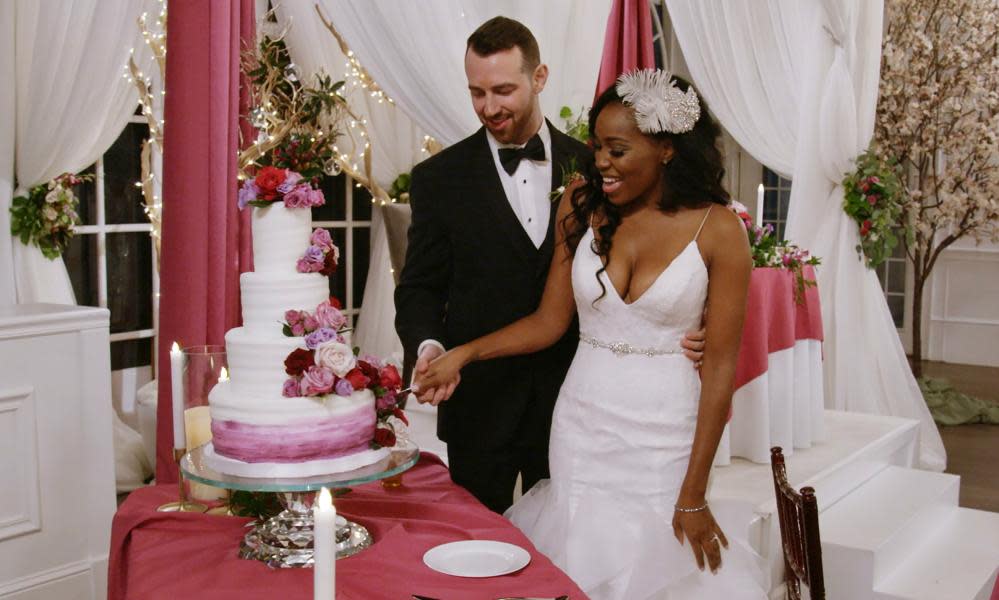Love is on the air: why we can't get enough of romantic reality shows

This summer, Netflix is sticking to the old television adage of “it ain’t broke, endlessly reproduce it in a slightly different format until it is.” After the runaway success of Love Is Blind and the viral infamy of Too Hot to Handle, the streaming service is bombarding viewers with romantic reality shows. Tomorrow sees the release of Say I Do, a series that sees couples getting married at their surprise dream weddings, in a similar vein to BBC Three’s Don’t Tell the Bride. Indian Matchmaking will also be airing, from 16 July, following marriage consultant Sima Taparia and her clients, while Love on the Spectrum, a four-part documentary that follows young adults with autism who are looking for love, begins on 22 July.
However, far from overestimating our capacity for watching romance, Netflix’s new releases appear to be shrewd ones. Despite millennials’ alleged disinterest in love (more than half of us are unmarried), we can’t seem to get enough of it on TV. Shows about love are, in a strange sense, my generation’s romcoms. These are shows filled with tender moments, misunderstandings and hi-jinks, but often less concerned with happy endings – most of the best-loved programmes are as much about destroying love as they are about finding it.
Where TV love is concerned, the breakups are as integral to the genre as the makeups. Perhaps that is why the past decade has seen a wave of ex-themed shows, from BBC Three’s Eating With My Ex to Netflix’s Back With the Ex and MTV’s Ex on the Beach. Dating shows always have their share of drama, but throwing a former lover into the mix all but guarantees tears, awkward silences and the airing of dirty laundry. Love is more prevalent than ever in gameshow formats, too, with shows such as Dinner Date and the recently pulled Take Me Out, which ran for 11 series on ITV.
With each new commission, producers up the ante to fulfil our insatiable need for chaos. Blind Date was once one of the most popular shows on TV, but the comparably basic offering was cancelled after two series after its Channel 5 return in 2017. Meanwhile, more controversial series, such as Five Guys a Week, in which participants let five potential partners stay in their home as they date en masse, and Naked Attraction, are going from strength to strength. Other sideways hits have included the “part performance, part blind date” series Flirty Dancing, which has been remade in the US, and Love in the Countryside, which followed seven rural singletons and was described by one Guardian writer as “the anti-Love Island”.
The universal appeal of many dating shows is that they hold out the possibility that it may all go wrong, that the fantasy of true love is just that. Our fixation with watching relationships fail also explains the boom of the “love experiment” genre, where the stakes are high and potential humiliation is baked into the format. Married at First Sight, in which total strangers tie the knot, is inherently messy; watching the rare handful of contestants form healthy, meaningful partnerships is simply a welcome side dish to what’s served as the main event: unrequited love and mismatched pairings. The Spouse House saw six men and six women move into a house with the intent of finding their ever after. The two weddings filmed on the show ended in divorce. As for Love Is Blind, the biggest shock was that any of the couples made it up the aisle at all.
Naturally, rather than wait for the cracks to show, programmes are now impatiently focused on relationships where the dysfunction is already built in. Couples Therapy watches couples do their best to pull back their partnerships from the brink, Love After Lockup follows individuals as they finally meet their fiances on their release from prison, and 90 Day Fiancé often focuses on odd couples navigating language barriers or large age gaps, who have applied for or received a temporary visa and have 90 days to marry. The potential for fallout is obvious. In a New York Times interview, Alon Orstein, one of the execs behind the show, seemed to all but confirm the behind-the-scenes stirring, referring to a seemingly well-suited pairing as “a love couple” and in the process, inferring that the other couples on the show were probably included because of the likelihood it would all go spectacularly wrong.
Compared with many of the shows dominating the current landscape, Netflix’s new offerings are notably wholesome (Say I Do is executive produced by the team behind the streamer’s tearjearking Queer Eye reboot). Indeed, there are still a number of dating shows that have a lot of heart. The Undateables looks at dating with a disability in a warm, nuanced way, and you get the feeling that producers of First Dates are actively trying to create compatible couplings. As with love itself, it does seem that there is a dating show for everyone. And while some viewers just love love and others simply love watching it crash and burn, we are all head over heels.

 Yahoo News
Yahoo News 
